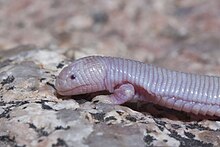User talk:LDMCZ
| Mexican mole lizard | |
|---|---|

| |
| Scientific classification | |
| Domain: | Eukaryota |
| Kingdom: | Animalia |
| Phylum: | Chordata |
| Class: | Reptilia |
| Order: | Squamata |
| Family: | Bipedidae |
| Genus: | Bipes |
| Species: | B. biporus
|
| Binomial name | |
| Bipes biporus (Cope, 1894)
| |
| Synonyms | |
The Mexican mole lizard (Bipes biporus), commonly known as the five-toed worm lizard, or simply as Bipes, is a species of amphisbaenian, which is endemic to the Baja California Peninsula. It is one of four species of amphisbaenians that have legs. It should not be confused with the axolotl, a salamander (Ambystoma mexicanum), which is usually called ajolote in Spanish.
Description
[edit]They are pink, lizard-like reptiles, 18–24 cm (7.1–9.4 in) snout-to-vent length and 6–7 mm (0.24–0.28 in) in width, that live for one to two years. Their skin is closely segmented to give a corrugated appearance, and like earthworms, their underground movement is by peristalsis of the segments. The forelegs are strong and paddle-like, while the hindlegs have disappeared, leaving behind only vestigial bones visible in X-rays.
Reproduction
[edit]This species is oviparous and the females lay one to four eggs in July. The species only breeds underground. The eggs hatch after two months.
Geographic range
[edit]The Mexican Mole lizard (B. biporus) is found in the states of Baja California, Baja California Sur, Guerrero and Chiapas, in Mexico.
Behavior
[edit]Like all other amphisbaenians, this burrowing species only surfaces at night or after heavy rain.
Diet
[edit]It is an opportunist carnivore and eats ants, termites, ground-dwelling insects, larvae, earthworms, and small animals including lizards. It usually pulls its prey down to the ground to start its meal.
References
[edit]- ^ Stejneger, L., and T. Barbour. 1917. A Check List of North American Amphibians and Reptiles. Harvard University Press. Cambridge, Massachusetts. 125 pp. (Bipes biporus, p. 72.)
Further reading
[edit]- Cope, E.D. 1894. On the Genera and Species of Euchirotidæ. American Naturalist 28: 436-437. (Euchirotes biporus)
- Stebbins, R. C. 2003. A Field Guide to Western Reptiles and Amphibians, Third Edition. The Peterson Field Guide Series. Houghton Mifflin. Boston and New York. xiii + 533 pp. ISBN 0-395-98272-3 (paperback). (Bipes biporus, pp. 428-429 + Plate 55 + Map 200.)
External links
[edit]- http://animals.jrank.org/pages/3700/Mole-Limbed-Wormlizards-Bipedidae-TWO-LEGGED-WORMLIZARD-Bipes-biporus-SPECIES-ACCOUNT.html
- http://animaldiversity.ummz.umich.edu/site/accounts/classification/path/Bipes_biporus.html#Bipes%20biporus
- Bipes biporus at the Reptile Database
- Photos and videos of the Bipes biporus

